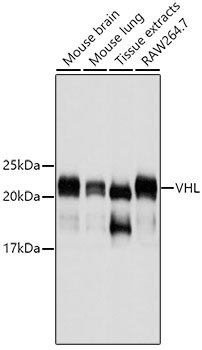Anti-VHL Mouse Monoclonal Antibody (CAB11872)
- SKU:
- CAB11872
- Product type:
- Antibody
- Reactivity:
- Human
- Reactivity:
- Mouse
- Reactivity:
- Rat
- Host Species:
- Mouse
- Isotype:
- IgG
- Antibody Type:
- Monoclonal Antibody
- Research Area:
- Signal Transduction
Description
| 抗体名: | Anti-VHL Mouse Monoclonal Antibody |
| 抗体コード: | CAB11872 |
| 抗体サイズ: | 50uL |
| 申し込み: | WB IHC IF IP |
| 反応性: | Human, Mouse, Rat |
| 宿主種: | Mouse |
| 免疫原: | Recombinant protein of human VHL |
| 申し込み: | WB IHC IF IP |
| 推奨希釈: | WB 1:500 - 1:2000 IHC 1:50 - 1:100 IF 1:50 - 1:100 IP 1:20 - 1:50 |
| 反応性: | Human, Mouse, Rat |
| ポジティブサンプル: | Mouse brain, Mouse lung, Tissue extracts, RAW264.7 |
| 免疫原: | Recombinant protein of human VHL |
| 精製方法: | Affinity purification |
| ストレージバッファ: | Store at 4?. Avoid freeze / thaw cycles. Buffer: PBS with 0.02% sodium azide, pH7.3. |
| アイソタイプ: | IgG |
| 順序: | Email for sequence |
| 遺伝子ID: | 7428 |
| Uniprot: | P40337 |
| セルラーロケーション: | Cytoplasm, Membrane, Nucleus, Nucleus, Peripheral membrane protein |
| 計算された分子量: | 18kDa/19kDa/24kDa |
| 観察された分子量: | 24kDa |
| 同義語: | VHL, HRCA1, RCA1, VHL1, pVHL, PVHL |
| バックグラウンド: | Von Hippel-Lindau syndrome (VHL) is a dominantly inherited familial cancer syndrome predisposing to a variety of malignant and benign tumors. A germline mutation of this gene is the basis of familial inheritance of VHL syndrome. The protein encoded by this gene is a component of the protein complex that includes elongin B, elongin C, and cullin-2, and possesses ubiquitin ligase E3 activity. This protein is involved in the ubiquitination and degradation of hypoxia-inducible-factor (HIF), which is a transcription factor that plays a central role in the regulation of gene expression by oxygen. RNA polymerase II subunit POLR2G/RPB7 is also reported to be a target of this protein. Alternatively spliced transcript variants encoding distinct isoforms have been observed. |
| UniProt Protein Function: | VHL: Involved in the ubiquitination and subsequent proteasomal degradation via the von Hippel-Lindau ubiquitination complex. Seems to act as target recruitment subunit in the E3 ubiquitin ligase complex and recruits hydroxylated hypoxia- inducible factor (HIF) under normoxic conditions. Involved in transcriptional repression through interaction with HIF1A, HIF1AN and histone deacetylases. Ubiquitinates, in an oxygen-responsive manner, ADRB2. Component of the VCB (VHL-Elongin BC-CUL2) complex; this complex acts as a ubiquitin-ligase E3 and directs proteasome- dependent degradation of targeted proteins. Interacts with CUL2; this interaction is dependent on the integrity of the trimeric VBC complex. Interacts (via the beta domain) with HIF1A (via the NTAD domain); this interaction mediates degradation of HIF1A in normoxia and, in hypoxia, prevents ubiqitination and degradation of HIF1A by mediating hypoxia-induced translocation to the nucleus, a process which requires a hypoxia-dependent regulatory signal. Interacts with ADRB2; the interaction, in normoxia, is dependent on hydroxylation of ADRB2 and the subsequent VCB- mediated ubiquitination and degradation of ADRB2. Under hypoxia, hydroxylation, interaction with VHL, ubiquitination and subsequent degradation of ADRB2 are dramatically decreased. Interacts with RNF139, USP33 and PHF17. Found in a complex composed of LIMD1, VHL, EGLN1/PHD2, TCEB2 AND CUL2. Isoform 1 and isoform 3 interact with LIMD1 (via LIM zinc-binding 2), AJUBA (via LIM domains) and WTIP (via LIM domains). Interacts with EPAS1. Expressed in the adult and fetal brain and kidney. 3 isoforms of the human protein are produced by alternative splicing. |
| UniProt Protein Details: | Protein type:Ubiquitin ligase; Tumor suppressor Chromosomal Location of Human Ortholog: 3p25.3 Cellular Component: nucleoplasm; intermediate filament cytoskeleton; mitochondrion; membrane; endoplasmic reticulum; cytosol; nucleus Molecular Function:protein binding; enzyme binding; ubiquitin-protein ligase activity; transcription factor binding Biological Process: negative regulation of cell proliferation; regulation of transcription, DNA-dependent; protein stabilization; positive regulation of transcription, DNA-dependent; cell morphogenesis; protein ubiquitination; negative regulation of transcription from RNA polymerase II promoter; proteolysis; positive regulation of cell differentiation; negative regulation of apoptosis Disease: Erythrocytosis, Familial, 2; Von Hippel-lindau Syndrome; Renal Cell Carcinoma, Nonpapillary; Pheochromocytoma |
| NCBI Summary: | Von Hippel-Lindau syndrome (VHL) is a dominantly inherited familial cancer syndrome predisposing to a variety of malignant and benign tumors. A germline mutation of this gene is the basis of familial inheritance of VHL syndrome. The protein encoded by this gene is a component of the protein complex that includes elongin B, elongin C, and cullin-2, and possesses ubiquitin ligase E3 activity. This protein is involved in the ubiquitination and degradation of hypoxia-inducible-factor (HIF), which is a transcription factor that plays a central role in the regulation of gene expression by oxygen. RNA polymerase II subunit POLR2G/RPB7 is also reported to be a target of this protein. Alternatively spliced transcript variants encoding distinct isoforms have been observed. [provided by RefSeq, Jul 2008] |
| UniProt Code: | P40337 |
| NCBI GenInfo Identifier: | 4033778 |
| NCBI Gene ID: | 7428 |
| NCBI Accession: | P40337.2 |
| UniProt Secondary Accession: | P40337,Q13599, Q6PDA9, B2RE45, |
| UniProt Related Accession: | P40337 |
| Molecular Weight: | Calculated: 18kDa/19kDa/24kDaObserved: 24kDa |
| NCBI Full Name: | Von Hippel-Lindau disease tumor suppressor |
| NCBI Synonym Full Names: | von Hippel-Lindau tumor suppressor, E3 ubiquitin protein ligase |
| NCBI Official Symbol: | VHL |
| NCBI Official Synonym Symbols: | RCA1; VHL1; pVHL; HRCA1 |
| NCBI Protein Information: | von Hippel-Lindau disease tumor suppressor; protein G7; elongin binding protein |
| UniProt Protein Name: | Von Hippel-Lindau disease tumor suppressor |
| UniProt Synonym Protein Names: | Protein G7; pVHL |
| Protein Family: | Von Hippel-Lindau disease tumor suppressor |
| UniProt Gene Name: | VHL |
| UniProt Entry Name: | VHL_HUMAN |


